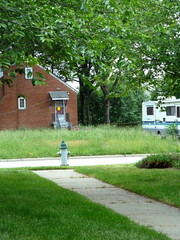New Guidelines Could Help Identify Responsibility for Sidewalk Maintenance

138-365 Retake of Daily Shoot DS132 Sidewalk Scene (Photo credit: krossbow)
Who is responsible for maintaining sidewalks in New Jersey? The answer to that question is about as gray as the concrete the sidewalks are made from, but it can be very important to anyone involved in an accident resulting from a hazardous walkway. If, after reading the following, you need assistance with a slip-and-fall accident on a faulty sidewalk, particularly in Hunterdon County, contact Victor A. Rotolo and the personal injury lawyers at Ragland Law Firm.
Essentially sidewalks are considered public areas, meaning the public has the right-of-way to access that area without being at risk of trespassing. (1) As such, there is an obligation to keep those walkways safe and in good repair. Whose responsibility that is right now depends largely on what kind of property abuts the sidewalk.
Previously this blog addressed the difference in responsibility of commercial property owners and residential and non-profit property owners. (See “Appeals Court Rules That Slip-and-Fall Lawsuit against Church Can Proceed,” April 1, 2012.) It was noted then that State law holds commercial property owners responsible for maintaining the sidewalks adjacent to their property, including making reasonable inspections of the property to discover potential damage. However, private homeowners and non-profit organizations, including religious entities like churches, are exempt from this responsibility with certain exceptions. Those exceptions include rental properties and damage occurring as the result of faulty construction or attempted repairs by the property owner.
Although current State law differentiates between commercial and non-commercial property owners regarding responsibility for property maintenance, individual municipalities don’t necessarily agree. In fact, some municipalities have charged residential property owners with the responsibility of maintaining the sidewalks outside their homes. The municipality of Highland Park in nearby Middlesex County is one example. Just recently, some 1,200 residents were issued letters giving them deadlines for making repairs to the sidewalks outside their homes, something local municipalities are within their rights to do. (2) This contradiction could soon be resolved if the State adopts a new Restatement of Torts, which is expected to be released as early as this year. (3)
The Restatement of Torts now recommends that the owner of a noncommercial property be liable for “natural conditions” that could pose a hazard on the sidewalks abutting their property provided it could be proven the owner was aware of the hazard or that the hazard was considered obvious. (3)
Adoption of this Restatement could change the way lawsuits resulting from slip-and-fall accidents are decided. For years New Jersey courts have refused to hold owners of residential properties responsible for making sure their sidewalks were safe despite local ordinances to the contrary. (3)
By clarifying the question of responsibility for maintenance of property, adoption of this third Restatement of Torts could help prevent pedestrian accidents on our State’s walkways. Absent of that, it could help victims of slip-and-fall accidents identify those liable and, therefore, enable the recovery of damages for injuries. For help with a slip-and-fall accident in Hunterdon County, contact the personal injury attorneys at Ragland Law Firm located in Lebanon, conveniently located near the intersection of Routes 22, 78 and 31.
(1) http://www.fhwa.dot.gov/environment/bicycle_pedestrian/publications/sidewalk2/sidewalks210.cfm
(2) http://www.nj.com/news/index.ssf/2012/07/amid_slippery_laws_towns_take.html
(3) http://www.law.com/jsp/nj/PubArticleNJ.jsp?id=1202563392409&slreturn=20120623085916
 New Jersey Injury Lawyers Blog
New Jersey Injury Lawyers Blog


